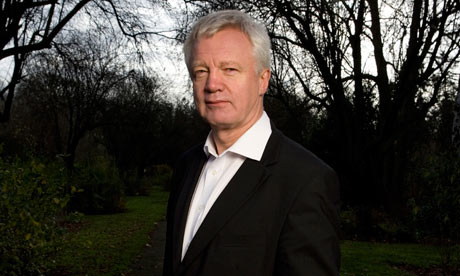Backbench rebellion prompts change to inmates with sentences of one year
Patrick Wintour Guardian Thursday 20 January 2011
 David Davis, the former shadow home secretary. Photograph: Richard Saker for the Observer
David Davis, the former shadow home secretary. Photograph: Richard Saker for the ObserverFaced by a backbench rebellion, the government is to slash the number of prisoners to be given the right to vote, even though it is likely to increase the risk of successful compensation claims against the government in court.
After a European court of human rights judgment, ministers responded by planning to give prisoners serving sentences of less than four years the right to vote. That is likely to be scaled back to those with sentences of one year.
The change follows talks at lunchtime yesterday between prime minister David Cameron and leading members of the Conservative 1922 backbench committee.
It represents a victory for the former shadow home secretary, David Davis, who was pressing for a rethink. Davis and the former Labour justice secretary, Jack Straw, recently won Commons time to stage a debate on the issue in about three weeks' time.
The debate would have exposed the scale of government divisions over the issue, but ministers will hope that the concession, more than halving the number of prisoners who will be entitled to vote, can quell backbench anger.
The four-year cut off would have given as many as 28,000 prisoners the right to vote – including some found guilty of violent crimes.
Ministers have said that more than 2,500 prisoners are likely to seek compensation on the basis that their rights have been violated, but they claim that the case law on the issue is still shifting in Europe, making it possible the British courts will sanction giving the vote to a relatively small number of prisoners.
Some Conservatives see the issue as one of principle: that the UK parliament and not the courts, interpreting the European convention, should decide.
The justice secretary Ken Clarke said yesterday that it was the exponential growth of judicial review and not the European convention that was doing the most to circumscribe the freedom of ministerial action in the UK.

No comments:
Post a Comment